What does normal even mean?” Jonathan Buckman asked. Buckman is not normal—he is unique and extraordinary by any measure, and that is what makes him such a great therapist, social worker, practitioner, neighbor, and friend. “Jonathan has attained master level accomplishments in so many domains, but you would never guess it if you were meeting him for the first time,” his bandmate, neighbor, and co-conspirator Jeff Gladchun told me. “You couldn’t ask for a better friend than Jonathan. He is one of a kind.”
“If everyone is unique, what are we even trying to fit into?” It is with this central question that Buckman begins his query as a therapist. “Some randomly invented, made-up and culturally perceived norm?” He asked. “Why? When that so often becomes the source of our self-worth issues.” He faces these concerns with clients of all ages to address the impacts of the outdated constructs. “Societal norms are the jail of our own making. We concoct a complex ego as both strategy and protection. But often that is where troubles begin, when we serve the group dynamic and abandon ourselves in the process.”
Jonathan Buckman began his career teaching at a New York City Charter School where he was responsible for tutoring math and reading, designing curriculum, and coaching a nationally ranked chess team. He and his wife Rachel Frey moved closer to her Michigan roots in 2013 to settle down and start their own family. Their son Emory was born in 2017. While Buckman was teaching at the Detroit Achievement Academy, he realized that his specialty was working with his students one on one, in small reading groups, and in his chess club. “That’s when I had to leave the classroom,” Buckman recounted. His wife, Frey, was a social worker. Buckman admired how revolutionary social work was historically. The first social welfare agencies appeared in the 1800s to confront the problems of poverty and inequality. The field continues to bring our nation’s social problems into the public’s eye.
Buckman pursued his master’s in social work (MSW/LMSW) from the University of Michigan, and began his therapist practice here in Ann Arbor, at the Still Waters counseling center in 2018. His special interest was in mindfulness, attachment theory, narrative informed therapy, play therapy, and psychedelic assisted therapy. Buckman always positioned himself on the cutting edge of the therapeutic approach. “I resist the modern definitions of what constitutes therapy,” Buckman said. “I think therapy can be so much more flexible than what it’s been.” After seven years in the traditional role, his orientation shifted toward ‘anti-therapy’. This is not his term, but a growing movement to expand what can be considered therapeutic beyond the confines of traditional talk therapy.
Recently, Johnathan Buckman introduced his new private practice, Elixir Therapy, to facilitate transformation through holistic wisdom. Designed to be short term, intensive, and bespoke, Buckman utilizes many human technologies such as meditation, tai-chi, sorcery, IFS (Internal Family Systems), and play therapy to custom fit each client’s temperament. “With daily support, we integrate a new behavior into long term memory,” Buckman explained. His innovative offerings are effective, with the goal that his clients won’t need therapy long term. His flagship approach begins by identifying something that is really important to the client. “Together we work to articulate how they want to feel. And then the action necessary to achieve that. And then we do that every single day.” By phone, texting, or in-person, Buckman supports his clients for at least 21 consecutive days of doing, so that the practice is embedded. “You have to do something every day consistently for it to become an entrenched element of who you are. Then you have hacked your system,” he shared.
The “21-day rule” supported by neuroscience posits that it takes three weeks for a new behavior to become ingrained. Buckman expanded the reasoning behind this rule, “Otherwise the knowledge gets neurally pruned.” His practice flips the format of a one-hour weekly session. “That is something that is missing from modern therapy, they aren’t offering daily support. Do something every day for 30 minutes, it will get you there.” Whether you’re trying to learn a new instrument, or a new language, “What is more crucial than relearning our relationship with self?” he asked. “This new boost in ability and accountability becomes the catalyst for lasting internal change.”
Initially, he seeks to understand his client’s belief system. “What is your view on the nature of the universe and how does that make you feel?” Then they co-create an approach that is informed and fine-tuned to fit. The process of articulation can be truly revelatory and therapeutic. “I realized how important it was to express their big picture, based on my own spiritual awakening,” Buckman shared. His own upbringing wasn’t particularly religious, but while struggling with a serious bout of depression Buckman had a defining experience that he credits as the source of his understanding. “I was so distraught, and thought if there is a way, I am ready to die right now. I just didn’t want to exist. Lying there, I felt like I left my body. Lifted, like I was moving toward an infinite orb of energy that was a source of boundless love. I knew inherently that this is what created the universe and all matter in it. I just knew it was the origin of everything.” Buckman doesn’t share this vision that informed his belief system lightly. He continued, “In that moment, through this infinite loving presence, I realized I signed up for this. I had chosen to be here, to be embodied, in this life, in this time. And that changed everything for me. I became a different person.”
His study of martial arts, Taoism, Buddhism, and Christianity influenced his spiritual practice and furthered his interest in philosophy and esoteric pursuits. Buckman cites his biggest influences as UG Krishnamurti, Michel Foucault, Carlos Castaneda, and Taisha Abelar. The next logical step in self-exploration led him to psychedelic-assisted exploration.
“That’s when psychedelics entered the equation. I found that early experimenting very helpful.” Buckman thanks Dr. Rick Strassman for affirming the positive impact of such exploration. Dr Strassman, a professor of psychiatry at the University of New Mexico School of Medicine is the author of the book The Spirit Molecule. His book details a five-year government-funded clinical research project on DMT, with human subjects in experimental conditions. DMT is the entheogenic drug N,N-Dimethyltryptamine. Buckman was moved. “I left my body, and the visions were realer than real.”
Experiencing, seeing, feeling, and interacting with beings from other realms is a common report of those who have undergone psychedelic treatments. “The universe is so much more wildly creative and complex than I could have ever imagined.” Buckman credits these experiences for a seismic shift in his mindset. “DMT is one of the most important therapeutic and healing discoveries that western culture has uncovered. That is why it is sometimes referred to as ‘the God molecule.’” Buckman still seemed astonished as he told me, “It felt like proof, that if we let go and accept the invitation into this internal travel, we can access just a glimpse of the mystery.”
Jonathan Buckman has a lot to share. After his martial arts dojo shut down, he still wanted to keep practicing Tai Chi, so he decided to share his own home for a weekly community practice. One evening a week, rain or shine, he hosts a ‘push-hands’ practice in his carport for anyone who would like to join. Push-hands is a two-person Tai Chi training technique that can be competitive or casual, serious or fun. At Buckman’s weekly gathering of 10-15 practitioners and friends, it is all that and then some. He sets out drinks and snacks and an eclectic playlist as he opens the interplay. His only instruction is that there are no instructions, “Anything goes. There are no rules, as long as you meet your partner where they are.” Simple and profound, subtle and sublime, there is a very low bar for entry and yet what there is to learn is limitless. Two simply match hands to mirror a dynamic-tension in this strategic technique. As a tai chi practitioner of over ten years, Josh Meisler shared, “Joining up with Jonathan is the best thing that has happened to my practice all year.”
Palm to palm, I first encountered Buckman through this practice. He is tall and forceful but immediately I met his light heart. Sensitive to more than just push, he finds the play, taking the practice from a martial art to more of a free-flowing form. The give and take, lead and follow, compete and collaboration in each action correlates with his therapeutic beliefs beautifully.
In his carport, Buckman displays a poster of the Taoist Inner Alchemy Chart —The Relationship of Body Mind and Spirit. “Deep in-breath, then breath-out to your fingertips, as you bring your arms out to shoulder height. Now arch your upper spine to engage your solar plexus here,” he instructed. Buckman points out the places on the chart that correspond to my internal system as he leads me through a series of movements, stretches, and breath work to build and move energy. “Inhale to fill like a balloon. Now let it sink into your core,” he continued. As I followed along, he cheered for me. “Yes, just like that.” My tensions dissolved and I found myself dropping into alignment. “You feel that?” He asked excitedly.
“I do.” A buzz emanated throughout my body. “That is the ‘golden elixir,’” he explained, as he led me through the exercises.
Buckman’s lifelong interest in martial arts and eastern teaching clearly motivates his work. He wants his clients to understand and access their own internal strength, both mental and physical. “He is the most enthusiastic and encouraging therapist I have ever witnessed,” said his colleague and friend Catherine Fritz, LLPC. Fritz co-facilitated a six-week course for neuro-divergent adolescents with Buckman and witnessed his unique touch. “He is one of the most patient people I have ever met. He can build strong rapport because he is so adaptable and responsive, with such a variety of options.” To help reset escalations or upset, Buckman played chess, did tai chi, or just sat with these teens, helping to teach kids how to regulate themselves. Fritz recounted an example of one teen that had discouraged his parents, teachers, and past therapists. “This kid was angry as a baseline. He was aggressive and destructive. Most people move away from that kind of behavior to distance themselves from such outbursts, but Jonathan has a way of moving toward them.” By the end of the course the teen was playing chess and learning how to play the piano.
“He has the sort of personality that, when he enjoys something, he goes all out,” his bandmate Jeff Gladchun shared. “Jonathan’s influence reaches far, wide, and deep. His authenticity, kindness, and willingness to be involved, is really quite amazing.” Engaging, intensive, and effective, Elixir Therapy is Jonathan Buckman. “What I am sharing is myself,” he affirmed. And that is something extraordinary.
You can inquire about Elixir Therapy and Jonathan Buckman online at Elixirtherapy.org or contact him at 917-658-7652 or elixirtherapymi@gmail.com.


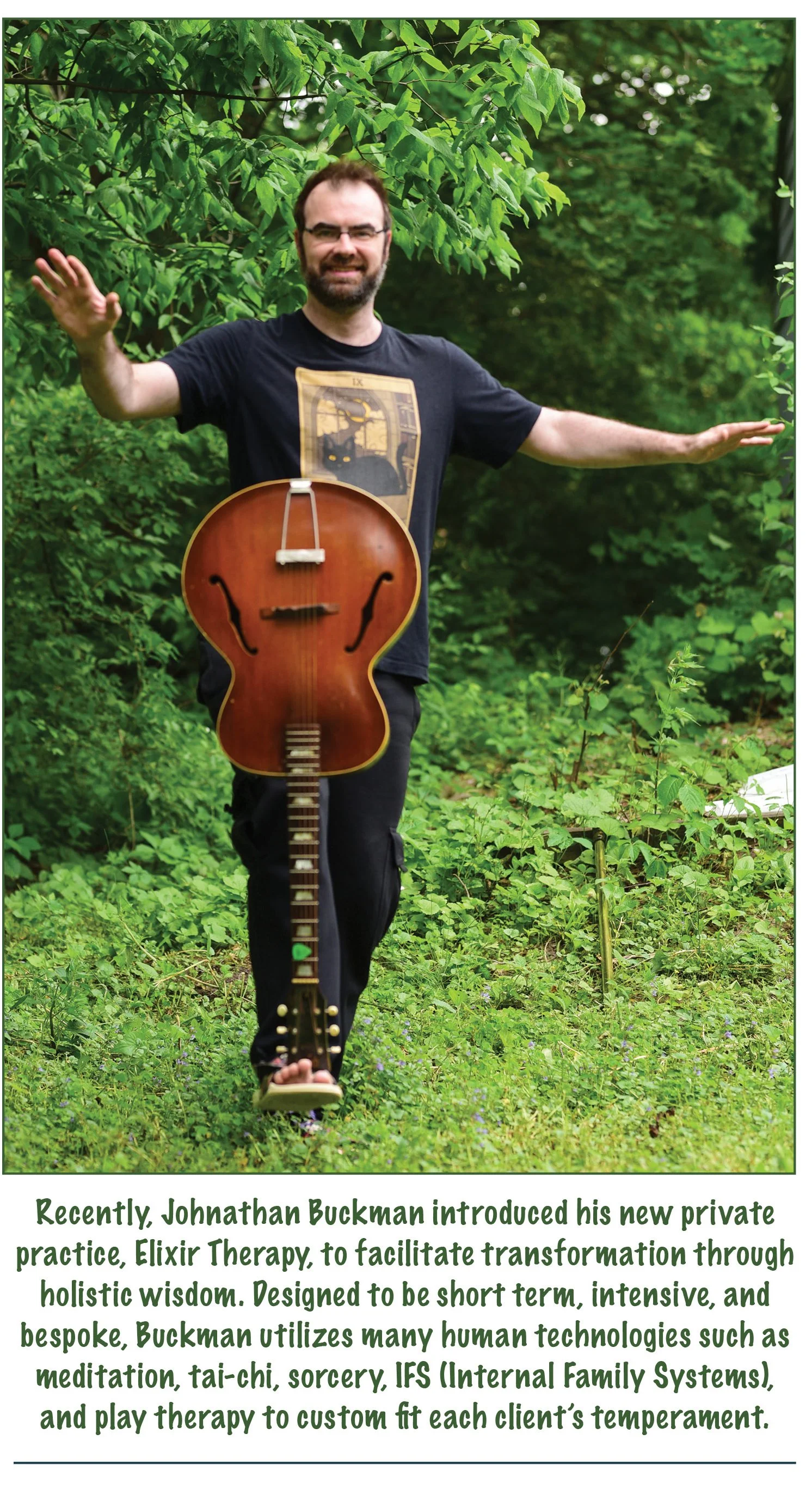
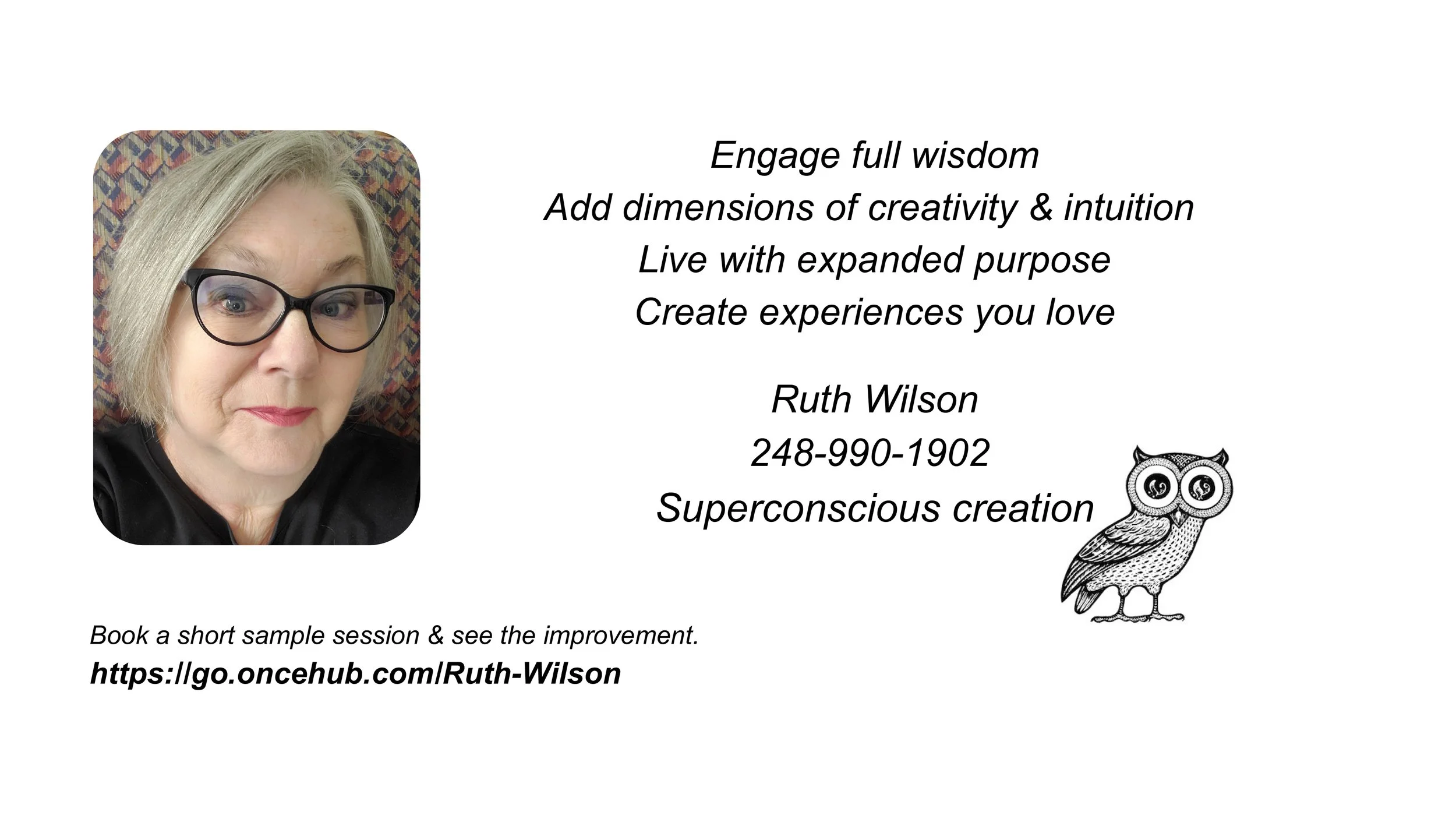

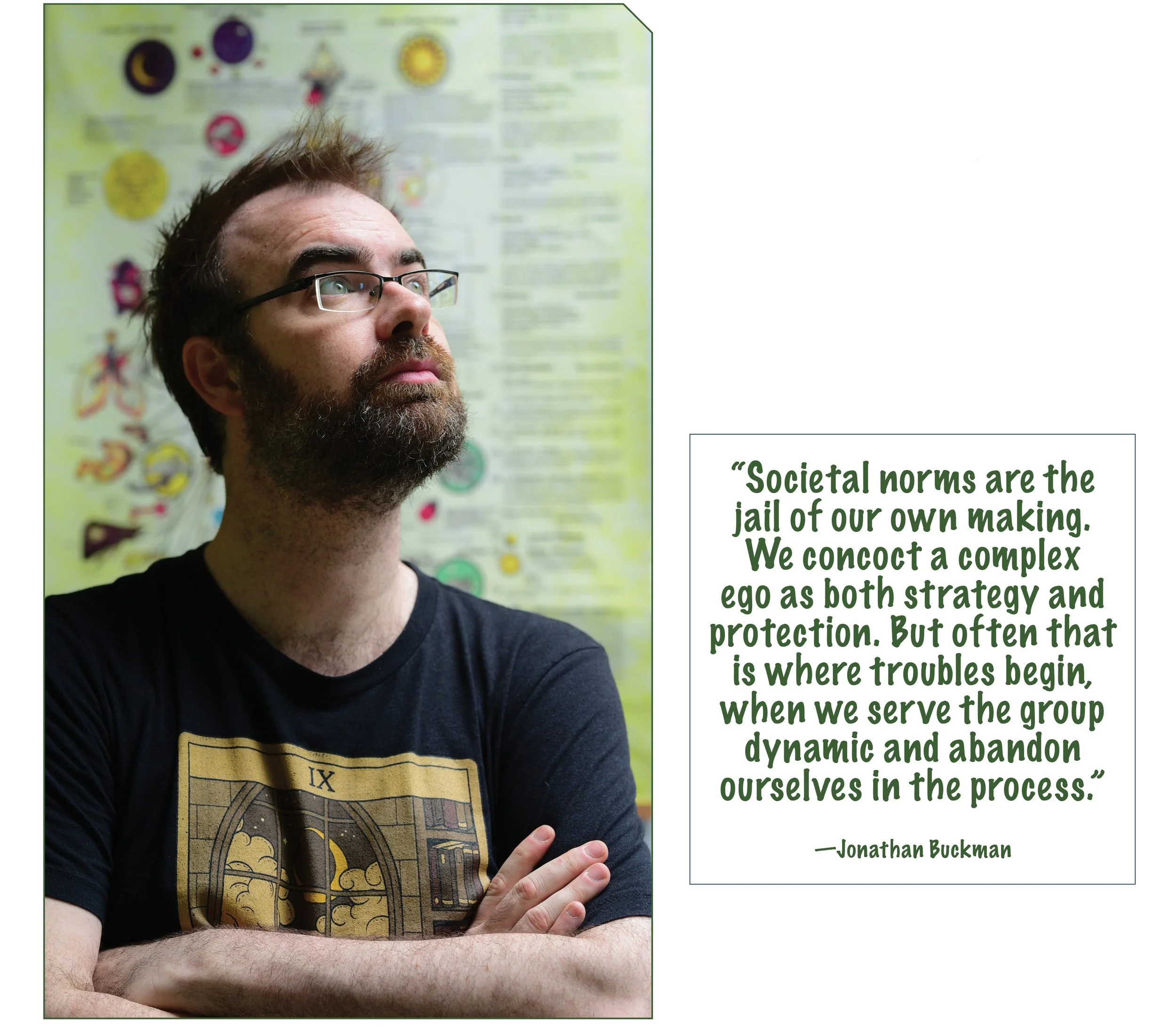
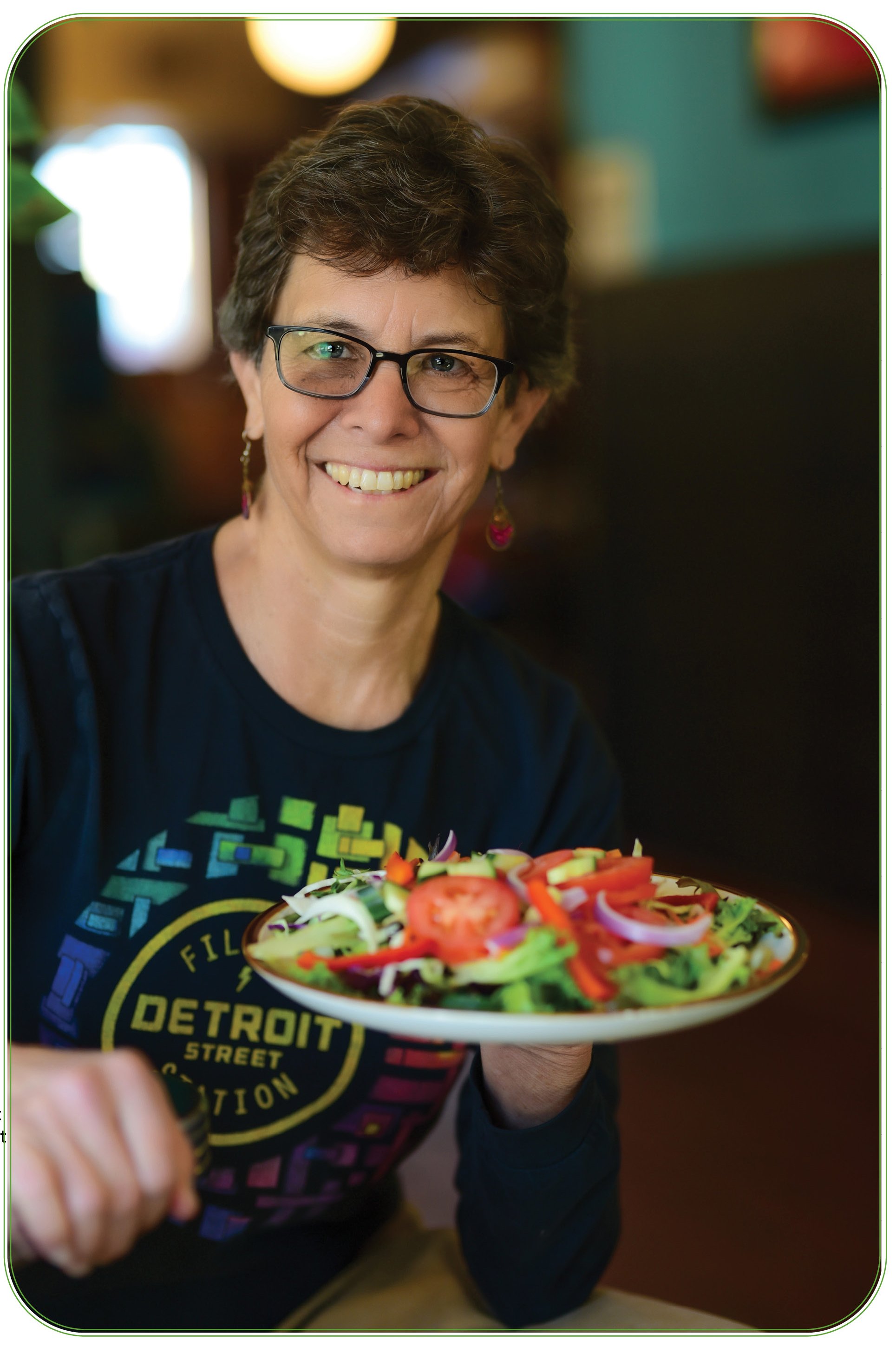





















































































































































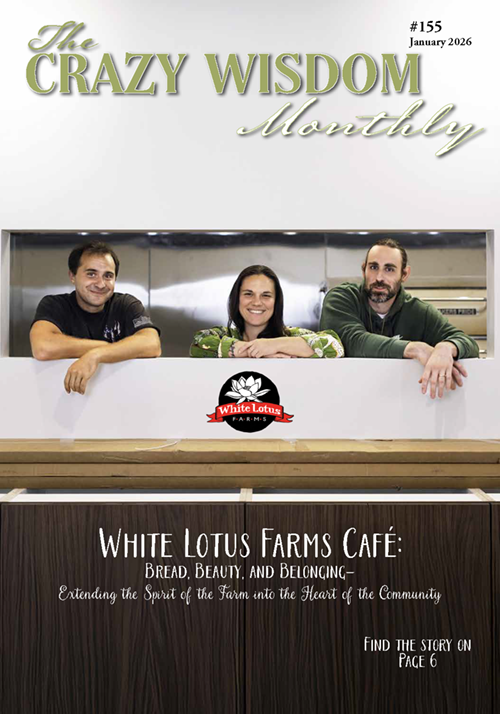









































As the Director of Washtenaw My Brother’s Keeper (WMBK), Jamall Bufford makes a powerful impression of warmth and conviction. “Everyone sees his heart,” his colleague Justin Harper said. “Jamall is a great person. It is easy to work with him because he is a good listener, a team player, and completely true to his convictions. When someone has those qualities, a lot of great things can happen.”